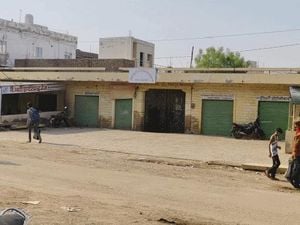On February 3, 2023, Jean-David E., a municipal employee from Toulouse, discovered his car had been broken open and his backpack, containing his identification and credit card, had been stolen. While he immediately reported the theft to the police and his bank, he later learned of surprising developments involving his stolen credit card, leading to what some might call a plot twist worthy of Hollywood.
After noticing dubious transactions on his account, Jean-David traced one of the charges—a €50 purchase—back to a nearby tobacco shop. There, the shopkeeper informed him two homeless men had used his card to buy scratch-off lottery tickets. Shockingly, one of those tickets turned out to be worth €500,000, the maximum prize allowed for such games.
"Without me, they wouldn't have won, but without them, I wouldn't have purchased the ticket," Jean-David told reporters from Le Parisien, expressing both disbelief and empathy toward the two men who stole his card. Despite his misfortune, his humanity shone through as he proposed splitting the winnings if they came forward. "I want to offer to share the earnings," he added.
But therein lies the dilemma: how can winnings derived from stolen property be legally claimed? The French National Lottery (Française des Jeux, FDJ) has not registered any claim for the jackpot, and police investigations continue. Jean-David has been informed by authorities, including input from the FDJ, which stated, "Depending on the circumstances, payments may be suspended when claims arise from reported disputes involving stolen property."
While the law may classify the ticket's winnings as belonging to the two homeless men, authorities would likely seize the funds due to the illegal nature of the ticket acquisition.
Despite his plight, Jean-David did not harbor bitterness. Instead, he issued another heartfelt appeal through the radio station RTL on February 21: if the two men came forward, he would drop his complaint, facilitating their access to the prize money. He admitted, "What the authorities say really doesn't matter. This ticket belongs to someone, and there should be room for compassion. "
But time is of the essence. With the ticket validity set at just 30 days after purchase, the clock is ticking. Jean-David's message to the thieves was clear: act fast or gamble away the winning ticket, which was initially purchased using stolen funds. "If they don't reach out to my lawyer, the ticket will be worthless," he said, underscoring the urgency of the situation.
Meanwhile, as the situation unfolded, questions arose about the ethical dimensions of the theft. Jean-David emphasized his willingness to compromise, explaining how sharing the money could alleviate burdens like his mortgage. "For such a sum, I am ready to make concessions, and it could change my financial future," the 40-year-old remarked. His approach highlights the often-overlooked human aspect of legal disputes and crime, challenging perceptions of victim versus perpetrator.
Jean-David's story reflects broader societal issues, including the struggles faced by homeless individuals and the desperate measures they sometimes resort to for survival. The incident has sparked dialogue within the community about poverty, justice, and morality.
Weeks have passed, and the €500,000 remains unclaimed amid uncertainty. The homeless men, who initially disappeared under the shadows of society, now hold the potential for redemption. If they accept Jean-David’s offer, they can avoid legal repercussions and may come out of this entangled situation with their share of the winnings.
Yet this incident raises poignant questions: What happens when lottery wins intermingle with crime? Should compassion extend to those who have erred? If the homeless men claim the prize, will they be met with empathy, or will society continue to stigmatize them? These are the reflections now echoing through the city of Toulouse, contemplating the peculiar intersection of fate, fortune, and human kindness.
Only time will tell how this story will end, but for now, it stands as both cautionary tale and hopeful narrative of unexpected possibilities.



